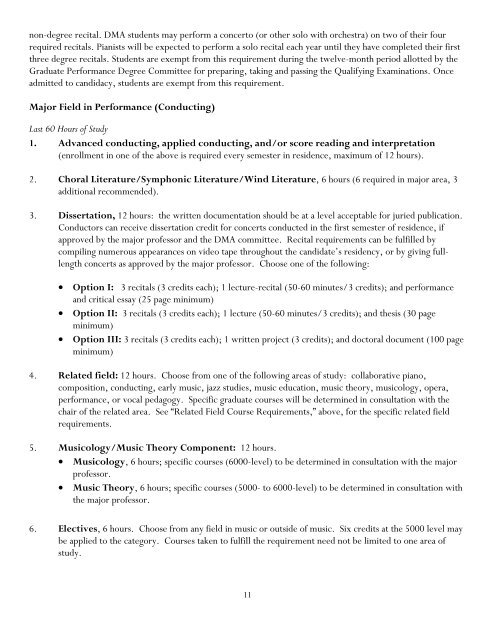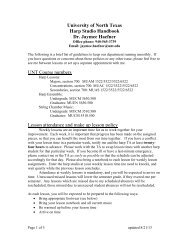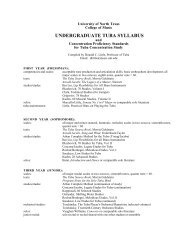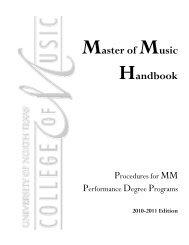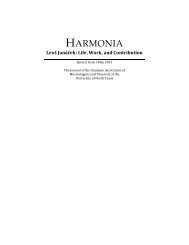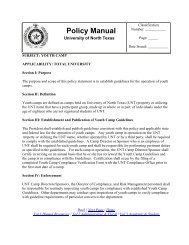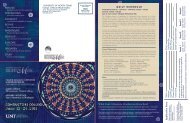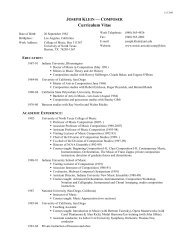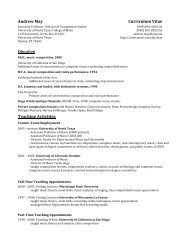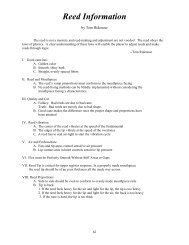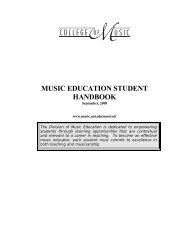Doctor of Musical Arts In Performance Handbook - UNT College of ...
Doctor of Musical Arts In Performance Handbook - UNT College of ...
Doctor of Musical Arts In Performance Handbook - UNT College of ...
Create successful ePaper yourself
Turn your PDF publications into a flip-book with our unique Google optimized e-Paper software.
non-degree recital. DMA students may perform a concerto (or other solo with orchestra) on two <strong>of</strong> their four<br />
required recitals. Pianists will be expected to perform a solo recital each year until they have completed their first<br />
three degree recitals. Students are exempt from this requirement during the twelve-month period allotted by the<br />
Graduate <strong>Performance</strong> Degree Committee for preparing, taking and passing the Qualifying Examinations. Once<br />
admitted to candidacy, students are exempt from this requirement.<br />
Major Field in <strong>Performance</strong> (Conducting)<br />
Last 60 Hours <strong>of</strong> Study<br />
1. Advanced conducting, applied conducting, and/or score reading and interpretation<br />
(enrollment in one <strong>of</strong> the above is required every semester in residence, maximum <strong>of</strong> 12 hours).<br />
2. Choral Literature/Symphonic Literature/Wind Literature, 6 hours (6 required in major area, 3<br />
additional recommended).<br />
3. Dissertation, 12 hours: the written documentation should be at a level acceptable for juried publication.<br />
Conductors can receive dissertation credit for concerts conducted in the first semester <strong>of</strong> residence, if<br />
approved by the major pr<strong>of</strong>essor and the DMA committee. Recital requirements can be fulfilled by<br />
compiling numerous appearances on video tape throughout the candidate’s residency, or by giving fulllength<br />
concerts as approved by the major pr<strong>of</strong>essor. Choose one <strong>of</strong> the following:<br />
• Option I: 3 recitals (3 credits each); 1 lecture-recital (50-60 minutes/3 credits); and performance<br />
and critical essay (25 page minimum)<br />
• Option II: 3 recitals (3 credits each); 1 lecture (50-60 minutes/3 credits); and thesis (30 page<br />
minimum)<br />
• Option III: 3 recitals (3 credits each); 1 written project (3 credits); and doctoral document (100 page<br />
minimum)<br />
4. Related field: 12 hours. Choose from one <strong>of</strong> the following areas <strong>of</strong> study: collaborative piano,<br />
composition, conducting, early music, jazz studies, music education, music theory, musicology, opera,<br />
performance, or vocal pedagogy. Specific graduate courses will be determined in consultation with the<br />
chair <strong>of</strong> the related area. See “Related Field Course Requirements,” above, for the specific related field<br />
requirements.<br />
5. Musicology/Music Theory Component: 12 hours.<br />
• Musicology, 6 hours; specific courses (6000-level) to be determined in consultation with the major<br />
pr<strong>of</strong>essor.<br />
• Music Theory, 6 hours; specific courses (5000- to 6000-level) to be determined in consultation with<br />
the major pr<strong>of</strong>essor.<br />
6. Electives, 6 hours. Choose from any field in music or outside <strong>of</strong> music. Six credits at the 5000 level may<br />
be applied to the category. Courses taken to fulfill the requirement need not be limited to one area <strong>of</strong><br />
study.<br />
11


